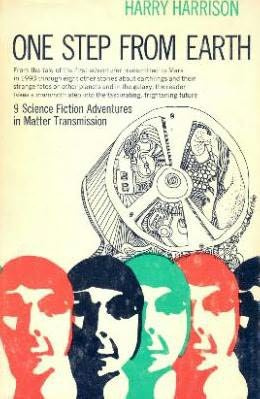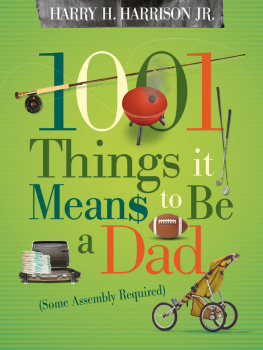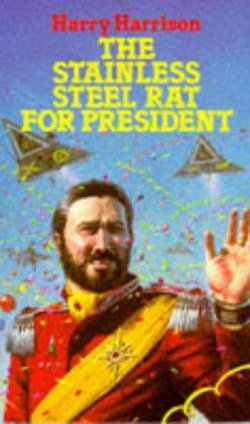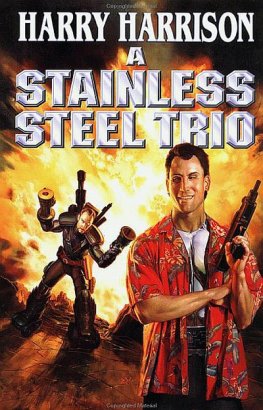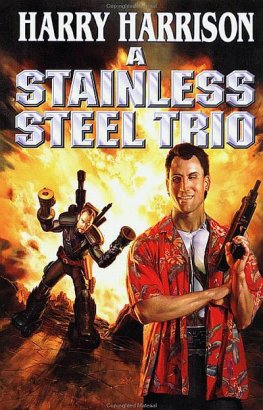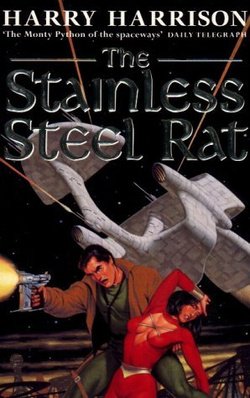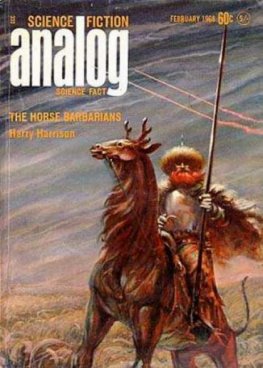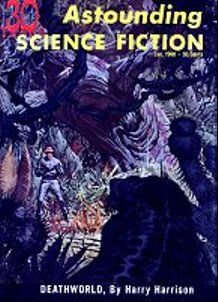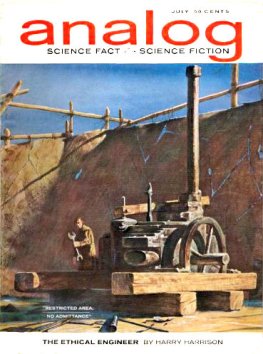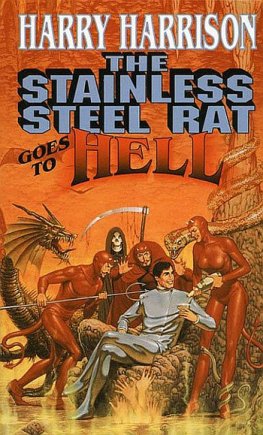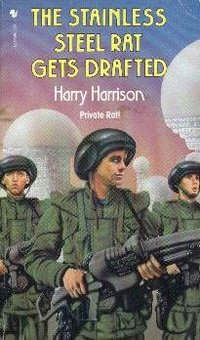Harry Harrison - One Step from Earth
Here you can read online Harry Harrison - One Step from Earth full text of the book (entire story) in english for free. Download pdf and epub, get meaning, cover and reviews about this ebook. year: 1985, publisher: Tor Books, genre: Detective and thriller. Description of the work, (preface) as well as reviews are available. Best literature library LitArk.com created for fans of good reading and offers a wide selection of genres:
Romance novel
Science fiction
Adventure
Detective
Science
History
Home and family
Prose
Art
Politics
Computer
Non-fiction
Religion
Business
Children
Humor
Choose a favorite category and find really read worthwhile books. Enjoy immersion in the world of imagination, feel the emotions of the characters or learn something new for yourself, make an fascinating discovery.
- Book:One Step from Earth
- Author:
- Publisher:Tor Books
- Genre:
- Year:1985
- Rating:5 / 5
- Favourites:Add to favourites
- Your mark:
- 100
- 1
- 2
- 3
- 4
- 5
One Step from Earth: summary, description and annotation
We offer to read an annotation, description, summary or preface (depends on what the author of the book "One Step from Earth" wrote himself). If you haven't found the necessary information about the book — write in the comments, we will try to find it.
One Step from Earth — read online for free the complete book (whole text) full work
Below is the text of the book, divided by pages. System saving the place of the last page read, allows you to conveniently read the book "One Step from Earth" online for free, without having to search again every time where you left off. Put a bookmark, and you can go to the page where you finished reading at any time.
Font size:
Interval:
Bookmark:
Harry Harrison
INTRODUCTION The Matter Transmitter
In the beginning there was walking, and mankind walked around the world. On foot, generation after generation, homo sapiens spread out from his homeland, usually considered to be in central Africa, and crossed the land bridges to the other continents. Later, after sailing craft had been perfected, isolated places like the Pacific islands were settled but the foot came first. Nor was it nor is it an inferior form of transportation by any test. The Roman roads were used by chariots and carts, but were built primarily to enable the foot soldiers to reach their objectives quickly and easily, sometimes at the other end of the continent.
The parallels can be easily drawn. When only the tiny minority traveled, society was fixed at a simple agrarian level. The life of the seventeenth-century European peasant differed very little from the life of the eleventh-century European peasant. Stuck in the mud. Destined to be born and to live and die in the same place. But not the seafarers. As soon as men could build ships to sail long distances-they did. The Myceneans visited England in the fifteenth century B.C. The Vikings went to North America in the eleventh century. A few hundred years later the Spanish pioneered regular routes to the Americans and the world was changed. For the worse, as far as the Amerinds were concerned, but certainly changed. Yet once the Europeans had covered the globe and grabbed what they could, things settled down rapidly to a condition pretty much like that which had gone before. Ships were improved, but they were essentially more of the same thing, and the world still dozed at home with little thought of the future. The industrial revolution was struggling to get started in England but was not making much progress. What is the use of having machines to make more products if the products just pile up in an empty lot next to the factory? They have to be moved away, and fast. Canals helped a bit and a lot were dug, but this was just a variant form of water transport and in essence added more ports to the world trade routes. People still walked or rode horseback or had the horses pull slow carts just as they had for a good number of centuries. What was needed was a radical change.
The railroads. In a few years everything was different. Raw materials streamed into the factories and manufactured materials spread out all over the world. Life would never be the same again. Everything changed. Apparently for the worse, if the slum-living factory workers were any judges. They must have felt like the Amerinds who saw the whitewinged ships sail into the bay. And just about the time the world was beginning to settle down to the new way of life brought about by the railroads the automobile was invented. Not only the buggywhip manufacturers went to the wall when the first cars chugged and backfired down the dirt roads. Entire cities were to be made unlivable within fifty years. Warm and happy Los Angles was turned into a poison-gas-filled, deteriorating community completely surrounded by concrete freeways and hurtling machines. Things were really moving faster by this time, and even while the cars were pushing out the trains and taking over the world, the airplanes were catching up and passing them by. New York City is now closer to London by plane than the rest of New York State is by car or train, closer than the state capital, Albany, is by ship, closer than its city limits are by foot.
That is where we stand now. Every facet of every part of our lives changed by the continuing transportation revolution of the past century. But what lies ahead? Rockets for one thing, and improved means of space travel that might be a little more practical and not quite as expensive. A good bit of modern science fiction has been involved with an investigation into the effects of space travel; nor is this well of speculation exhausted yet. Strange devices have been used to postulate space exploration across the light-year gaps between suns space warps, subspace drives, and such and distant, yet unknown worlds have become story material. Is this all?
Of course not. Time travel is really a form of transportation, and has its own literature. And then there is the matter transmitter.
This is a good solid theme that has not really received too much attention. And what attention it has received has been, for the most part, only about how you build the thing and make it work and what happens when it breaks down. Sort of like early science fiction where the story ended when the rocket took off. Basically, matter transmitters deal with solid objects in much the same way television deals with light waves. An image is received by a TV camera where it is broken down into a signal which is then transmitted to a receiver that converts the signal back into a visible image. MT
derived from matter transmitter in the same way TV comes from television has usually been visualized as a breaking up of the original substance by scanning the molecules and atoms one at a time, then blasting out this scanning signal to be rebuilt at the receiving end. Sometimes the signal is stored rather than being broadcast which leads to much fun and games when the same person is rebuilt over and over again from his recordings.
Most MT stories have been of this fun-and-games variety, all involved with building the machine and seeing what it does to the first victims who are fed therein. All of which can be very interesting, but is by no means a complete picture of the possibilities of MT. Let us think ahead a bit. If we can imagine an operating MT we can certainly consider the possibility of the widespread use of MTs. If the machine works it can be made to work cheaper and better and soon we might be using MTs the same way we use telephones now. Possible? Of course.
But what is the effect on man and his institutions when this happens?
That is the basic question. From it come the secondary questions. Every facet of life poses a new problem: food and clothes, marriage and business, work and war. Certainly war; the military latches onto every invention no matter how innocuous and uses it to keep the war machines clanking. Positively medicine; look how ships have spread disease and how airplanes could do it even better then consider the MT plague carriers. Language, social customs, everything will be affected by this new form of transportation.
In these stories I have attempted to speculate about the answers to some of these questions. I have started at the beginning, when MT is first used, and have gone on to the end, as I think all good stories should. I do not pretend that any of the things I predict will happen, though they certainly might if we ever have operating MT. This is one of the possible histories of the future that could come about under certain circumstances. But that is one of the pleasures of science fiction. It gives people a chance to fly in rocket ships before they are invented, use strange devices still undiscovered, meet fascinating people yet unborn.
A matter transmitter is very easy to use. Just dial your number, there, as simple as a telephone, and wait until the ready light comes on. Then step forward, you won't feel a thing, just walk through the MT screen as though it were a door....
Font size:
Interval:
Bookmark:
Similar books «One Step from Earth»
Look at similar books to One Step from Earth. We have selected literature similar in name and meaning in the hope of providing readers with more options to find new, interesting, not yet read works.
Discussion, reviews of the book One Step from Earth and just readers' own opinions. Leave your comments, write what you think about the work, its meaning or the main characters. Specify what exactly you liked and what you didn't like, and why you think so.

